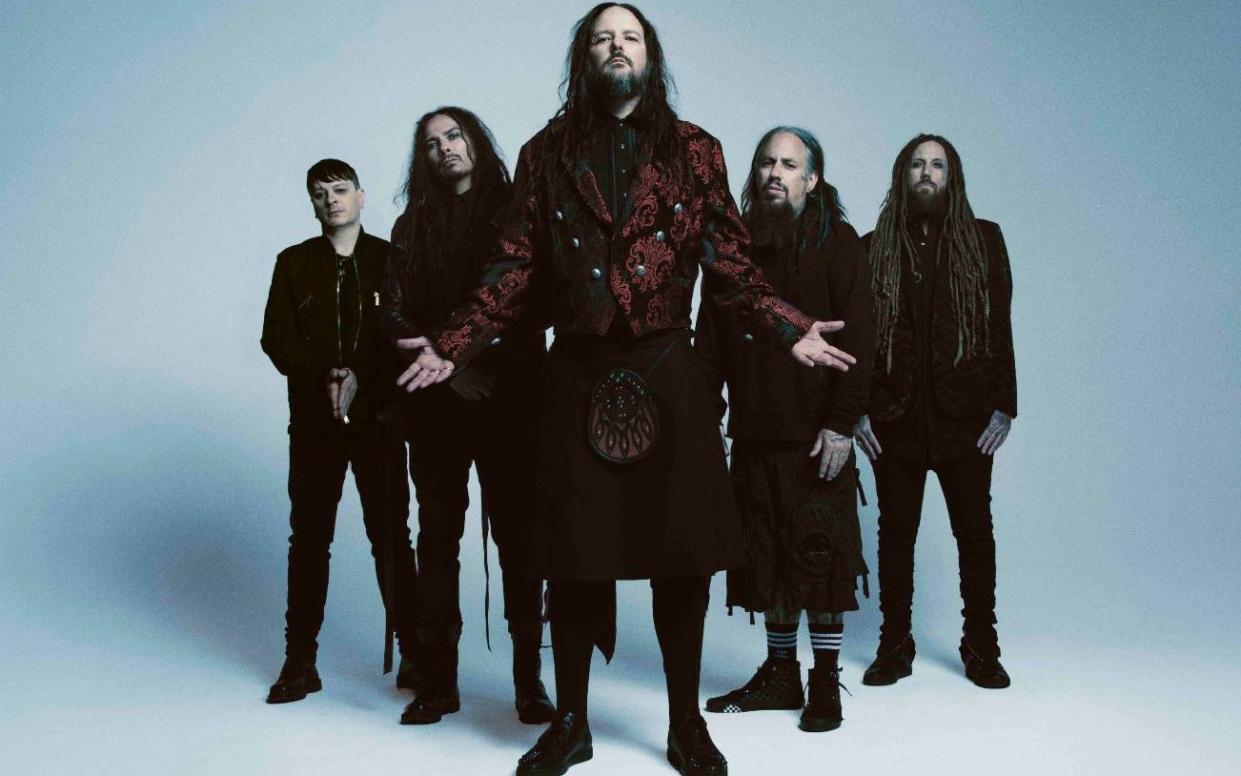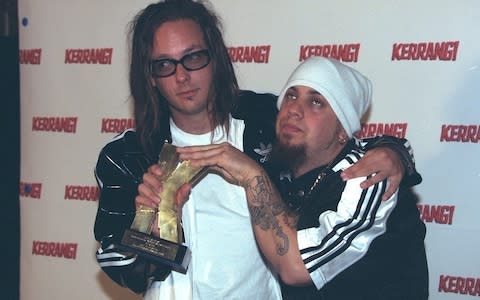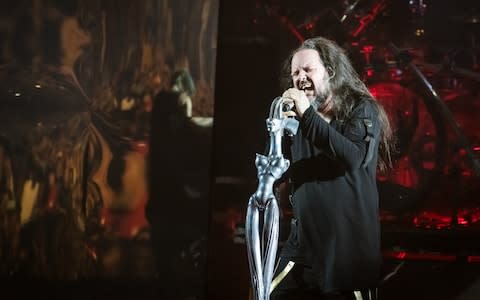Drugs, darkness, and life after death: how Nu-Metal pioneers Korn finally grew up

This summer saw the anniversary of a Woodstock festival about which no one said a word. It wasn’t the 50th birthday of the happening in 1969 that everyone seems to remember so fondly, but rather one of its two successors, Woodstock ’99, that no one does.
No one, that is, apart from Jonathan Davis, the singer with Californian metal pioneers Korn. The band played a hectic set on the event’s first night, a point before which things onsite truly went south. The front man remembers having a rare old time of it, and also recalls “that everybody else was having a great time, too.”
If the original Woodstock was justly billed as "3 days of peace & music", 30 years on it was a long weekend of anarchy and uproar. From the start, things were messy. The pay-per-view event held in high summer in Rome, New York, lacked adequate toilet facilities from which an audience of 400,000 people might peaceably piss away the bottles of water for which they’d been charged up to nine dollars a pop (this after being searched on entry and having provisions brought from the Outside World confiscated). After three days of wading ankle deep in sewage, come the final night the people had had enough.
As Red Hot Chili Peppers concluded their set, some in the crowd set light to the very stage on which the band were playing - a cover version of Jimi Hendrix’s Fire, ironically enough - as well as anything else on which they could lay their hands. Elsewhere a young man died after collapsing in the heat while watching Metallica. In the aftermath of the event, police investigated four cases of rape; one of these was an incident of gang rape that an eyewitness claimed had taken place during Korn’s set. In a write up on the West Coast, the San Francisco Examiner described Woodstock ’99 as "the day the music died".
Jonathan Davis is still not having it. He remembers that Korn, along with “Limp Bizkit and Ice Cube all flew in on a big 737 private jet” that was “like a flying fortress, a flying palace. We all got on the plane and flew from LA to an airport near the site, which, as an experience, is up there with one of the best of all time for me.
“[Woodstock ‘99] was amazing,” he says. “Our night was so badass. Everybody talks about all the horrible s___ that went down, but my memories of it are great.”
This is worth mentioning because, in its way, Woodstock ’99 is an event as epochal its most celebrated predecessor. If the gathering half a century back served as the most vivid snapshot of the prelapsarian hippy ideal, 30 summers later a gathering that featured on its rosters acts such as Rage Against The Machine, The Offspring and Megadeth can rightly be seen as the closing chapter on a decade of American musical rage.
Few bands who trade in this currency shout and ball with quite the emphasis, and quite the finesse, of Korn. The group came together in Bakersfield, California, 26 years ago, after Jonathan Davis himself agreed to join on the advice of a psychic. Whether guided by higher powers or not, it was, on balance, a wise move. Little more than a year after forming, Korn released their self-titled debut album, which duly sold more than two million copies in the US alone.
Davis describes the band back then as a unit “that didn’t want to achieve anything,” and if this is so they were a revolutionary force entirely by accident. The group took the decision, extraordinary at the time, to eschew guitar solos, and instead focused on gravitational rhythms played on seven-string guitars down-tuned to the point at which they made Metallica sound like the Cheeky Girls. Jonathan Davis appeared onstage dressed in a kilt while singing at a microphone stand designed by the artist and Alien creature designer HR Giger. The front man didn’t care at all that some people wondered if he might be gay, and spoke openly about being molested as a child.

Korn’s music quickly came to be known as ‘nu-metal.’ For a time the NME toyed with the term ‘sports metal’, possibly because of the band’s liking of bespoke one-of-a-kind Adidas apparel. Prior to an appearance at the Krazy House in Liverpool in the summer of 1996, one supporter was sufficiently taken with Davis’s look that he nicked a pile of his clothes from the band’s tour bus parked outside the venue. He then attended the concert wearing these items and was spotted by the singer stage-diving.
But whatever name by which it went, the music was fearsome stuff. One writer described the band’s sound as being ‘as disturbing as discovering blood in your toilet bowl.’ Needless to say, the kids couldn’t get enough of it.
“I wasn’t ready for success,” is how Jonathan Davis remembers things. “One minute we were touring and we’d be out in the crowd handing out demo cassettes and be at parties at people’s houses, and then the next minute we’ve got bodyguards and you can’t go anywhere and you can’t do shit.
“Everything was just so different,” he says. “I had my freedom taken away, so I started drinking more, and doing more drugs, and I ended up in a dark place. From that, you either survive or you don’t. And that’s really how it is.”
For a while there, it was touch and go. Davis had an appetite for booze, cocaine and crystal methamphetamine, rarely a winning combination. With a friendly demeanor and a voice so gentle that it sounds as if it ought to be presenting Book At Bedtime, today he recalls being discovered by his first wife and their young son on the doorstep of his home “covered in s___ and puke” after being dropped off the night before by friends with whom he’d been, as the verb has it, "partying".
Understandably, his partner was not wholly impressed, while his child regarded him “like some kind of hideous monster.” For his part, Davis recognised the occasion as a nadir from which it would be unwise to burrow further. This year he celebrates his 21st year of sobriety.

“I felt that if I didn’t stop I was going to die,” he says. “I certainly drank to die. I’d drink, do a couple of lines, drink some more, throw up, and then do it all over again… But [ultimately] it was great because when I got sober it coincided with the time when we became most popular, so I was able to experience that properly.”
Today each of Korn’s five members is clean, a state of collective unity that took years to attain. In 2005 guitarist Brian ‘Head’ Welch stepped away from the chaos of life in the band in order to ‘serve the Lord Jesus Christ as his savior,’ as a statement from the group’s management put it. The statement didn’t go so far as to suggest that Welch had taken leave of his senses, but it did imply that he may well have misplaced them.
For his part, the guitarist explained that “I was walking one day, just doing my rock’n’roll thing, making millions of bucks, you know, success and everything, addicted to drugs, and the next day I had the Revelation of Christ and I was, like, everything changes right now!” And so it did, at least to a degree. Seven years after being baptised in the Jordan river, in 2012 Welch re-joined Korn, with both his Christian faith and his sobriety fully intact.
Jonathan Davis is at pains to deny that his group are a dysfunctional bunch, describing his band mates as “my brothers and my best friends.” But prior to this enjoyable conversation with a these days kindly 48-year old, my one previous experience with Korn left me with the impression that the band were nothing if not a handful.
In 2005, I travelled to Moscow to interview them for a British magazine. This would have been fine were it not for the fact that Davis himself was difficult and dull, and that the group’s drummer at the time, David Silveria, had spent the previous night with a Russian pop singer and was now nowhere to be found.
The band themselves were greatly amused by their colleague’s conquest, unlike their translator who was ashen-faced with worry that he might have been kidnapped by gangsters. “This is a very serious situation,” she kept saying, again and again.
A photo session in Red Square was promptly cancelled, and replaced by a 60-second 12-frame shoot against a blank wall in the innards of the Dvorets Sporta Luzhniki arena in which the band were performing, just minutes before show time. As the panicked photographer snapped away, one of the group’s handlers hurried him along by loudly counting down the final 10 seconds of this briefest of encounters. The three-day trip - which was not written up in a flattering manner - cost Korn’s record company eight thousand pounds.
Predictably, given this kind of carry on, the band’s public profile has wobbled somewhat over the years, particularly in the United Kingdom. From being the future of metal in the 1990s, a decade or more later Korn’s standing was so low that Jonathan Davis agreed to be photographed making tea for the editorial staff of Kerrang! magazine in exchange for a measly one-page feature. Duly, a call was placed by the band’s manager to the publication’s editor to see where “things had gone wrong.”
But if Korn spent far too long behaving like the kind of rock stars their music never suggested they were, their output has remained constant. More than this, in recent years the band’s recorded work has returned to the kind of creative peaks seen earlier in their career. These days a top 10 concern once more, steadying the ship has been good for business.
Given this, it seems ironic, and certainly tragic, that The Nothing is perhaps Korn’s most tortured album to date. The reason for this are the events that inform its lyrical themes, namely the death last year of Davis’ estranged wife, the adult film performer Devin Davis, from an accidental overdose of heroin, cocaine and prescription drugs.
Inevitably, the couple’s troubles had played out in the public realm, with TMZ reporting that Jonathan Davis had filed for divorce in 2016, and reported the singer claiming that his wife would “routinely bring home unsavoury characters, including strangers. Some of these people are random fans of my music who she allows to come into the house, go into the master bedroom closet and try on my clothes.”
— Jonathan Davis (@JDavisOfficial) August 23, 2018
Shortly before Devin Davis’s death, Jonathan Davis filed a domestic violence restraining order against his estranged wife.
“[The Nothing] is about what happened, and all about the darkness that is around me because of that,” he says today. “It was a very dark road, and I’ve never hurt like that in my entire life. It was the kind of pain that I cannot explain.
“My wife was very mentally ill and it just got her,” he says. “I tried everything I could, both me and my [two] sons. It was just so hard. I was trying to save everybody and the cards just fell where they fell and it was just gut-wrenching. But I’ve got to move on and I’ve got to heal.”
There are no prizes for guessing the means through which Jonathan Davis seeks to find such comfort.
“Music’s everything to me,” he says. “Music is my religion. It’s the place where I go to heal; it’s very cathartic. How could it not be? I get to go out and tour the world and make people feel good and get out all of my aggressions. Without it, I don’t know what I’d be.”
The Nothing by Korn is available from Friday on Roadrunner Records

